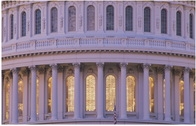Advertisement
Nationwide Title Clearing Issues QM Safe Harbor Rule to Congress

Nationwide Title Clearing Inc. (NTC) has approached Congress with a request that a safe harbor provision be built into the definition of the Qualified Mortgage (QM). According to the company, a strong legal safe harbor provides the best way of achieving congressional intent to balance consumer safeguards with access to credit. Otherwise, company executives warned, a severe shortage of affordable mortgage credit to middle class families could occur.
The proposed rule offers two potential options for constructing the QM—a “safe harbor” or a “rebuttable presumption of compliance.” Only one will be adopted in the final rule, and a decision is expected by the CFPB after the November presidential election. NTC believes that Congress should encourage the CFPB to implement the QM as a safe harbor to ensure that a large number of American families will not be cut off from access to safe and affordable mortgages.
Under a legal safe harbor, if the creditor has originated a loan by following the guidelines under the QM, there will be certain protections from litigation. Under a safe harbor, litigation will only consider whether the QM guidelines have been met.
A rebuttable presumption of compliance means that, although the lender is assumed to have assured the consumer’s ability to repay the mortgage, the consumer can still sue for reasons outside the normal underwriting process, which places a burden of proof on the lender to prove in court that it met the QM guidelines, and potentially allows for opinions by judges on what should have been considered in the underwriting process. Under a rebuttable presumption of compliance with qualified mortgages, the consumer can also litigate against a lender using their lack of ability to repay the mortgage as a foreclosure defense, even if the lender followed the underwriting guidelines issued by the Consumer Financial Protection Bureau (CFPB).
“With a safe harbor, costs will be reduced for qualified borrowers and it will decrease the chance that lenders will leave the market,” said John Hillman, NTC’s chief executive officer. “Under the rebuttable presumption of compliance, lenders will be apt to be ultra conservative in originating loans, potentially making homeownership less affordable to many Americans… [A rebuttable presumption] also means the costs of the resulting litigation will ultimately be paid for by all borrowers through increases in all loan rates to account for the future potential litigation.”
NTC says it will continue to advocate for legislation and regulations that will standardize the real estate market and mortgage industry for the benefit of homeowners.
“We welcome the opportunity to work with members of Congress and their staff to identify and incorporate industry best practices into a new, national standard for residential mortgage servicing,” Hillman said. “We are committed to providing feedback to help avoid excessively burdensome legislation and regulation for mortgage lenders and servicers because those kinds of restrictions ultimately have a negative impact on homeowners.”
About the author





